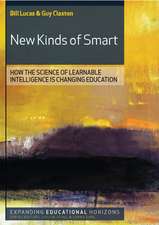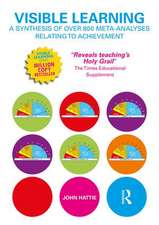Technology Innovations for Behavioral Education
Editat de Mary Banks Gregersonen Limba Engleză Paperback – oct 2014
The psychology of multi-media education maximizes learning by involving many different sensory modalities. Although multi-media has long meant use of film and other electronic modality adjuncts like Powerpoint, newer technologies expand these horizons further. Now multi-media pedagogy means not only newer technologies, but also newer, and different education techniques. This book describes psychology innovation currently making educational settings competent and competitive.
Student choice rules in education today. The technologically driven environment produces students whose preference is incumbent on electronic research means. Besides using these tools themselves, students thirst for multi-media pedagogy in the classroom online and on campus. It is therefore teachers who close the digital divide between generations in order to educate effectively. Approaches using new technologies and techniques have proven successful internationally with diverse audiences.
| Toate formatele și edițiile | Preț | Express |
|---|---|---|
| Paperback (1) | 630.43 lei 6-8 săpt. | |
| Springer – oct 2014 | 630.43 lei 6-8 săpt. | |
| Hardback (1) | 635.96 lei 6-8 săpt. | |
| Springer – 12 mai 2011 | 635.96 lei 6-8 săpt. |
Preț: 630.43 lei
Preț vechi: 741.68 lei
-15% Nou
Puncte Express: 946
Preț estimativ în valută:
120.65€ • 125.49$ • 99.60£
120.65€ • 125.49$ • 99.60£
Carte tipărită la comandă
Livrare economică 15-29 aprilie
Preluare comenzi: 021 569.72.76
Specificații
ISBN-13: 9781489990846
ISBN-10: 1489990844
Pagini: 92
Ilustrații: XVII, 72 p.
Dimensiuni: 155 x 235 x 5 mm
Greutate: 0.14 kg
Ediția:2011
Editura: Springer
Colecția Springer
Locul publicării:New York, NY, United States
ISBN-10: 1489990844
Pagini: 92
Ilustrații: XVII, 72 p.
Dimensiuni: 155 x 235 x 5 mm
Greutate: 0.14 kg
Ediția:2011
Editura: Springer
Colecția Springer
Locul publicării:New York, NY, United States
Public țintă
ResearchCuprins
Foreword.- Introduction.- Virtual Classrooms and Practice Communities Promote Culturally Responsive Health Care.- Behavioral Creative Techniques to Teach Graduate and Medical Students.- Telemental Health Competencies: Training Examples from a Youth Depression Telemedicine Clinic.- Teaching Students to be Competent Opinion Leaders via LEAD.- Internet Research Strategies for Finding High-quality Content.- Ethics and Legality of Psycho-education and Psycho-services Online.
Recenzii
From the reviews:
"If you train behavior change scientists or clinical practitioners this book has ideas you can use. Educational technology can be especially valuable for teaching in the complex intersection of psychology and health and this slim volume offers many heuristic examples.
Several chapters impressed me. Miguel Sabido's method which "applies behavioral change theory through creative mass media outlets" and results in "entertainment with proven social benefit" (p. 7). Literally hundreds of television programs around the world have benefitted millions with better health.
Gregerson's lists (pp. 10-13) of books on the issues and uses of cinema in medical humanities, self and graduate education, and especially psychology is an invaluable.
Wallin offers many hints to make our internet searching more productive. By including the terms and formats she offers the searcher becomes the finder: time saving, homing in, and best, finding the highest quality resources. The ways to evaluate the quality of a website (do not use is visual appeal) are especially valuable in our state of information overload. She also explains how to use specialized tools to organize what we find.
Two fine chapters address first, telemedicine competencies helpfully separating technology competencies from clinical competencies and from outreach competencies, and then conceptualizing the educators' roles in maximizing patient's self care, incorporating best practices, and then evaluating the outcomes.
The volume is capped with a chapter on ethical issues in media psychology with a dozen short examples of the kinds of errors and omissions we might make in dealing with the media.
All in all, a fine set of chapters introducing important topics and offering valuable resources." (Ed Zuckerman, Ph.D., June 2011)
“Gregerson … provides seven articles, a foreword, and a preface that cover examples of the roleof technology in education, health, and mental health. … presents many visual examples from websites of how consumers should evaluate the quality of mental health and psychology sites. … explains how to use Google and other search engines, how to filter by domain, and how to use sidebars, ‘wedgewords,’ ‘feeds,’ and Google Scholar. … is invaluable for undergraduate professors to inform students … on research uses of the Internet.” (Dolores McCarthy, PsycCRITIQUES, Vol. 56 (43), October, 2011)
"If you train behavior change scientists or clinical practitioners this book has ideas you can use. Educational technology can be especially valuable for teaching in the complex intersection of psychology and health and this slim volume offers many heuristic examples.
Several chapters impressed me. Miguel Sabido's method which "applies behavioral change theory through creative mass media outlets" and results in "entertainment with proven social benefit" (p. 7). Literally hundreds of television programs around the world have benefitted millions with better health.
Gregerson's lists (pp. 10-13) of books on the issues and uses of cinema in medical humanities, self and graduate education, and especially psychology is an invaluable.
Wallin offers many hints to make our internet searching more productive. By including the terms and formats she offers the searcher becomes the finder: time saving, homing in, and best, finding the highest quality resources. The ways to evaluate the quality of a website (do not use is visual appeal) are especially valuable in our state of information overload. She also explains how to use specialized tools to organize what we find.
Two fine chapters address first, telemedicine competencies helpfully separating technology competencies from clinical competencies and from outreach competencies, and then conceptualizing the educators' roles in maximizing patient's self care, incorporating best practices, and then evaluating the outcomes.
The volume is capped with a chapter on ethical issues in media psychology with a dozen short examples of the kinds of errors and omissions we might make in dealing with the media.
All in all, a fine set of chapters introducing important topics and offering valuable resources." (Ed Zuckerman, Ph.D., June 2011)
“Gregerson … provides seven articles, a foreword, and a preface that cover examples of the roleof technology in education, health, and mental health. … presents many visual examples from websites of how consumers should evaluate the quality of mental health and psychology sites. … explains how to use Google and other search engines, how to filter by domain, and how to use sidebars, ‘wedgewords,’ ‘feeds,’ and Google Scholar. … is invaluable for undergraduate professors to inform students … on research uses of the Internet.” (Dolores McCarthy, PsycCRITIQUES, Vol. 56 (43), October, 2011)
Notă biografică
Dr. Mary Gregerson is the President of a consulting firm, Health, Environment, and Performance Psychology in Leavenworth, KS. She began teaching as an undergraduate and was awarded a Danforth Fellowship for graduate studies based upon her teaching credentials. Her educational publications started with Graduate and Postgraduate Medical Education with the Synchronous Systems Model, based upon a conceptual model that integrates the physical environment like technology into the biopsychosocial model for health, disease, and wellness. In addition to other articles on A role for clinical psychology in health care and policy concerning the physical environment and Shift happens: Embracing technology anchors psychology in electronic streams of revenue, she has edited special editions of The Amplifier, newsletter for the APA Div 46 Media Psychology on Research/Education in Media Psychology, Creativity Media Psychology, New Technologies Media Psychology, Education in Media Psychology. Over 30 years as an educator, Dr. Gregerson has taught undergraduates, graduates, medical students, colleagues, and non-traditional students, with an emphasis on multi-cultural concerns, optimizing teaching effectiveness, and using creative experiential techniques. Springer Science + Media has just published her first book The Cinematic Mirror for Psychology and Life Coaching.
Textul de pe ultima copertă
Technology Innovations for Behavioral Education
Mary Gregerson, editor
Evolving alongside technological advances is a new generation of tech-savvy, media-attuned students, particularly in graduate and medical programs. But while much is being made of a growing digital divide between teachers and learners, inventive instructors are using the new electronic media to design educational strategies that are creative and practical, engaging and effective.
Technology Innovations for Behavioral Education documents these successful strategies emphasizing both technology-powered breakthroughs and psychology-driven instructional techniques reflecting the quantum leap in how students learn and what they have come to expect in the classroom. In these pages, multimedia pedagogy in itself involves multitasking, as competency development encourages technological development and improvements in health care education translate into improvements in client care. Chapters explore leading-edge uses of technology and examine foundational issues of critical value to working in new-media contexts, including:
Technology Innovations for Behavioral Education is inspiring reading for educators and graduate students in post-graduate education like medicine, public health, and mental health. This text is a primer for learning this burgeoning field and an idea book for making the most of itspotential.
Mary Gregerson, editor
Evolving alongside technological advances is a new generation of tech-savvy, media-attuned students, particularly in graduate and medical programs. But while much is being made of a growing digital divide between teachers and learners, inventive instructors are using the new electronic media to design educational strategies that are creative and practical, engaging and effective.
Technology Innovations for Behavioral Education documents these successful strategies emphasizing both technology-powered breakthroughs and psychology-driven instructional techniques reflecting the quantum leap in how students learn and what they have come to expect in the classroom. In these pages, multimedia pedagogy in itself involves multitasking, as competency development encourages technological development and improvements in health care education translate into improvements in client care. Chapters explore leading-edge uses of technology and examine foundational issues of critical value to working in new-media contexts, including:
- A virtual-classroom approach to culturally responsive health care.
- Film as a mass media model for health-promoting behaviors.
- Training for telemental health care: bridging technology, clinical, and outreach competencies.
- New technology as tools in professional development.
- Research techniques for locating high-quality mental health information on the Web.
- Ethical and legal issues in media psychology.
Technology Innovations for Behavioral Education is inspiring reading for educators and graduate students in post-graduate education like medicine, public health, and mental health. This text is a primer for learning this burgeoning field and an idea book for making the most of itspotential.
Caracteristici
Broad survey of available technologies Practices linked to conceptual frameworks to better prepare students Focuses on innovations that foster best practices











